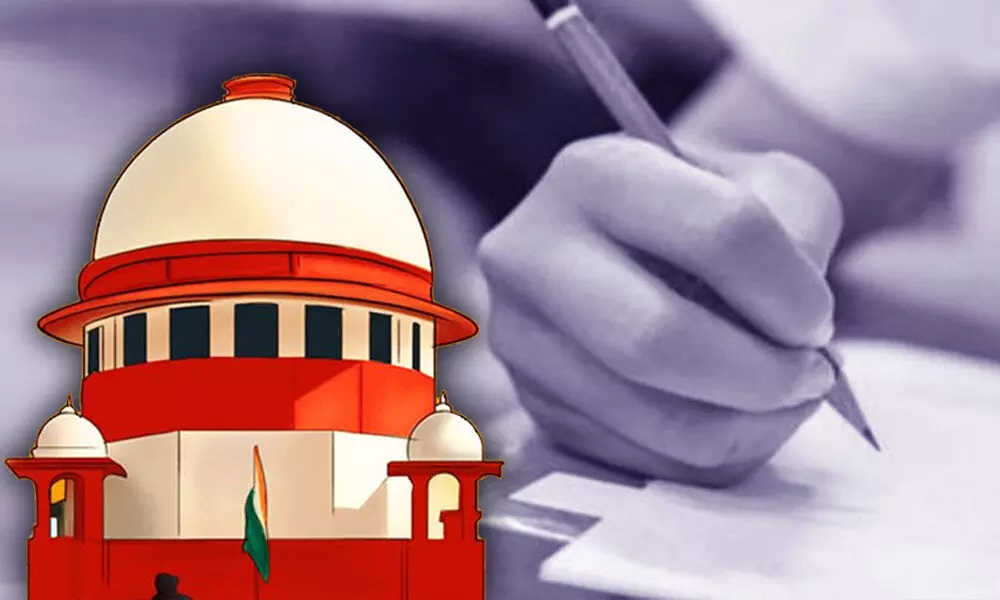Just In
NEET-PG admissions: Supreme Court says need to end uncertainty, Centre urges to allow counselling


NEET-PG admissions: Supreme Court says need to end uncertainty, Centre urges to allow counselling
The Supreme Court on Wednesday said it is important to put an end to uncertainty in connection with NEET-PG admissions, as the Centre requested it to allow counselling
New Delhi: The Supreme Court on Wednesday said it is important to put an end to uncertainty in connection with NEET-PG admissions, as the Centre requested it to allow counselling, which is on hold currently against the backdrop of objections raised regarding income criterion of Rs 8 lakh for economically weaker sections (EWS).
Solicitor General Tushar Mehta, representing the Centre, submitted before a bench, headed by Justice D.Y. Chandrachud, that the government would not accept any position whereby the OBC or EWS aspirants, whether pre or post the exercise is deprived of something, which is legitimately due to them.
Mehta emphasised that the quota dates back to January 2019, and it has been implemented across the country. "We are at a point where counselling is stuck. We need doctors in this difficult situation, and we, as a society, cannot go into reservation and lengthy arguments," he said. He added that like any other report, any intelligent mind can point out errors in the report, and the question would be whether the poorest of the poor is over-inclusive, and added they are not.
He urged the court to allow the counselling to begin, and in the meantime, it could consider the objections.
The bench, also comprising Justice A.S. Bopanna, asked senior advocates Arvind Datar and Shyam Divan, representing the petitioners, their views on Mehta's suggestion on commencement of counselling. "Need to put an end to this uncertainty," it noted.
The petitioners' counsel insisted that the rules of the game should not change.
During the hearing, Divan argued that postgraduate admissions must be completely merit-based and reservation must be minimal and referred to Supreme Court judgments which hold that there should be no reservation in super-speciality courses.
Datar submitted that there are two difficulties for letting the counselling. "If the counselling is done based on the report, then our plea is dismissed at the threshold. When your lordships say allow counselling, does it mean allowing admissions on Rs 8 lakh limit?"
Divan added that in many courses, postgraduation is the end of the road, which means super-speciality in some departments. He added, therefore, the principle of super-speciality will apply to postgraduate courses too.
The top court will continue to hear the matter on Thursday.
The Centre has told the top court that Rs 8 lakh income criterion for determining the EWS is much more stringent than the one for the OBC creamy layer.
The Centre has accepted the report of a three-member panel constituted to revisit the EWS criteria. The panel, in its report, said: "Firstly, the EWS's criteria relates to the financial year prior to the year of application whereas the income criterion for the creamy layer in OBC category is applicable to gross annual income for three consecutive years."
The panel added, "Secondly, in case of deciding the OBC creamy layer, income from salaries, agriculture and traditional artisanal professions are excluded from the consideration whereas the Rs 8 lakh criteria for EWS includes that from all sources, including farming. So, despite being the same cut-off number, their composition is different and hence, the two cannot be equated."
The panel comprised former Finance Secretary Ajay Bhushan Pandey, Prof V.K. Malhotra of ICSSR, and Principal Economic Advisor to the government, Sanjeev Sanyal. The panel was set up on November 30.
The top court is hearing writ petitions challenging 27 per cent reservation for Other Backward Classes (OBC) and 10 per cent reservation for EWS in all-India quota seats for postgraduate medical courses. As many as 15 per cent seats in MBBS and 50 per cent seats in MS and MD courses are filled through All India Quota from the candidates selected through the NEET.

© 2024 Hyderabad Media House Limited/The Hans India. All rights reserved. Powered by hocalwire.com






